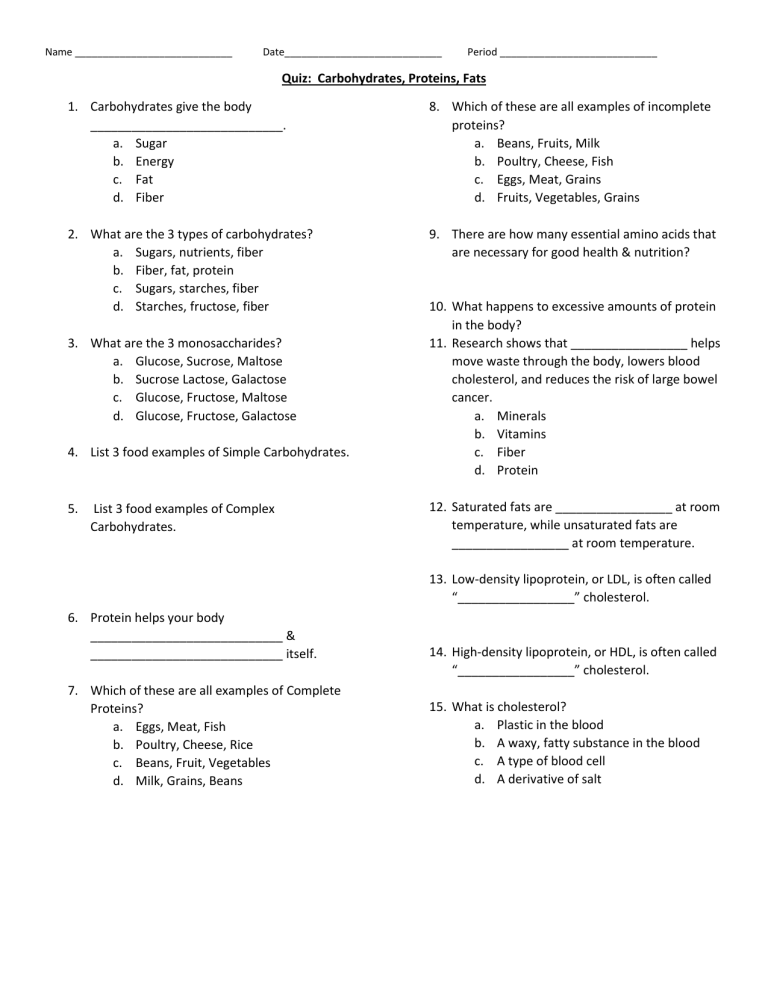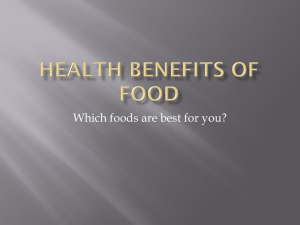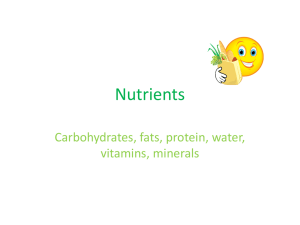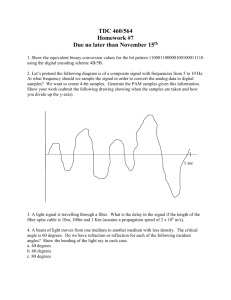
Name ____________________________ Date____________________________ Period ____________________________ Quiz: Carbohydrates, Proteins, Fats 1. Carbohydrates give the body ____________________________. a. Sugar b. Energy c. Fat d. Fiber 8. Which of these are all examples of incomplete proteins? a. Beans, Fruits, Milk b. Poultry, Cheese, Fish c. Eggs, Meat, Grains d. Fruits, Vegetables, Grains 2. What are the 3 types of carbohydrates? a. Sugars, nutrients, fiber b. Fiber, fat, protein c. Sugars, starches, fiber d. Starches, fructose, fiber 9. There are how many essential amino acids that are necessary for good health & nutrition? 3. What are the 3 monosaccharides? a. Glucose, Sucrose, Maltose b. Sucrose Lactose, Galactose c. Glucose, Fructose, Maltose d. Glucose, Fructose, Galactose 4. List 3 food examples of Simple Carbohydrates. 5. List 3 food examples of Complex Carbohydrates. 10. What happens to excessive amounts of protein in the body? 11. Research shows that _________________ helps move waste through the body, lowers blood cholesterol, and reduces the risk of large bowel cancer. a. Minerals b. Vitamins c. Fiber d. Protein 12. Saturated fats are _________________ at room temperature, while unsaturated fats are _________________ at room temperature. 13. Low-density lipoprotein, or LDL, is often called “_________________” cholesterol. 6. Protein helps your body ____________________________ & ____________________________ itself. 7. Which of these are all examples of Complete Proteins? a. Eggs, Meat, Fish b. Poultry, Cheese, Rice c. Beans, Fruit, Vegetables d. Milk, Grains, Beans 14. High-density lipoprotein, or HDL, is often called “_________________” cholesterol. 15. What is cholesterol? a. Plastic in the blood b. A waxy, fatty substance in the blood c. A type of blood cell d. A derivative of salt Name ____KEY________________________ Date____________________________ Period ____________________________ Quiz: Carbohydrates, Proteins, Fats 1. Carbohydrates give the body ____________________________. a. Sugar b. Energy c. Fat d. Fiber 2. What are the 3 types of carbohydrates? a. Sugars, nutrients, fiber b. Fiber, fat, protein c. Sugars, starches, fiber d. Starches, fructose, fiber 3. What are the 3 monosaccharides? a. Glucose, Sucrose, Maltose b. Sucrose Lactose, Galactose c. Glucose, Fructose, Maltose d. Glucose, Fructose, Galactose 4. List 3 food examples of Simple Carbohydrates. Donut, cake, candy 5. List 3 food examples of Complex Carbohydrates. Green vegetables, pasta, oatmeal 6. Protein helps your body _____Grow__________ & _______repair_______________ itself. 7. Which of these are all examples of Complete Proteins? a. Eggs, Meat, Fish b. Poultry, Cheese, Rice c. Beans, Fruit, Vegetables d. Milk, Grains, Beans 8. Which of these are all examples of incomplete proteins? a. Beans, Fruits, Milk b. Poultry, Cheese, Fish c. Eggs, Meat, Grains d. Fruits, Vegetables, Grains 9. There are how many essential amino acids that are necessary for good health & nutrition? 9 10. What happens to excessive amounts of protein in the body? Turns to fat 11. Research shows that _________________ helps move waste through the body, lowers blood cholesterol, and reduces the risk of large bowel cancer. a. Minerals b. Vitamins c. Fiber d. Protein 12. Saturated fats are ___solid_____ at room temperature, while unsaturated fats are __liquid______ at room temperature. 13. Low-density lipoprotein, or LDL, is often called “____BAD_____________” cholesterol. 14. High-density lipoprotein, or HDL, is often called “_____GOOD____________” cholesterol. 15. What is cholesterol? a. Plastic in the blood b. A waxy, fatty substance in the blood c. A type of blood cell d. A derivative of salt


